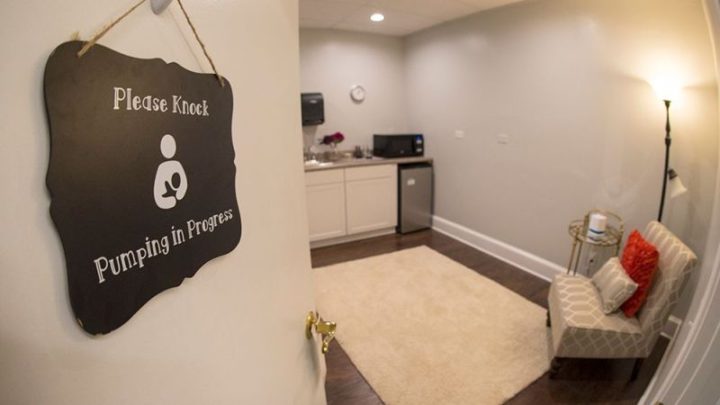“I really think that it sounds all warm and fuzzy to be family-friendly,” says Kit Cramer, president and CEO of the Asheville Area Chamber of Commerce. But she quickly adds, “I’m not talking warm and fuzzy: I’m talking about dollars and cents here. When it comes to your greatest asset and your biggest expense, it is all personnel, more than likely. If you want to attract and retain that personnel, that expensive entity that could make the difference for your organization, you need to be thinking about the whole person.”
The United States is the only developed nation that lacks a federal mandate for paid leave for birth, adoption or foster placement of a child, according to a 2017 study by the Organization for Economic Cooperation and Development. Opponents say providing such benefits would cost too much. Proponents, however, argue that for businesses as well as workers, the benefits far outweigh the costs.
A Guide to Family Forward Workplaces, a research-driven publication released in January by the North Carolina Early Childhood Foundation, aims to provide a framework for both large and small businesses to develop or enhance a range of family-friendly policies, such as paid family leave, flexible work schedules, employer-paid health insurance and access to workplace facilities for breastfeeding mothers. The free guide is available for download through the foundation’s Family Forward NC initiative.
Co-author Lisa Finaldi says that while the benefits for children and families may be self-evident, the guide aims to demonstrate the advantages for businesses.
“We were looking for policies where it was clear that there was a benefit to a company and to the employee and their family,” she explains. “When a company is able to offer some more benefits that are family-friendly, it is really helping the company both hire the best talent and retain qualified people.”
Skills gap
North Carolina’s low unemployment rate (3.7 percent as of December, according to the Bureau of Labor Statistics), coupled with a growing demand for skilled employees, makes it hard for employers to find and retain qualified workers, notes Finaldi, community engagement leader for the Early Childhood Foundation.
“It’s known in our state that we have a skills gap,” she explains. “By next year, more than 65 percent of the population will really need a beyond high school education in order to be competitive in the workplace, and right now, only about 45 percent of workers have that.”
That gives skilled workers a leg up in the marketplace, and across North Carolina, job seekers are favoring companies that offer more benefits and try to accommodate working parents, Finaldi points out. Research compiled in the new guide demonstrates that millennials, now the largest demographic in the U.S. workforce, are more likely to stick with employers who offer health and wellness benefits such as paid family leave. The guide also pegs the cost of replacing an employee at about 21 percent of the position’s annual salary.
“We found, in the paid leave category, that people come back to work and they’re committed to their employer — and in the end, that saves a lot of money in terms of recruitment and getting people up to speed in their job,” notes Finaldi.
Making space
Other types of family support, such as providing a place where new

mothers can pump and store breast milk, can also help companies maintain a competitive edge when seeking qualified employees, says Finaldi.
One company that’s raising the bar for workplace breastfeeding facilities is Aeroflow Healthcare, an Asheville-based medical equipment provider that employs approximately 375 people. Jennifer Jordan, the founder and director of the Mom and Baby Division, says the idea of providing breast pumps and a place to use them stemmed from both her knowledge of the industry and her own experience as a working mother.
“Being a leader here at Aeroflow, I feel like it’s really easy to put myself in that mom’s shoes and understand the challenges she has, and then also look at it from an employer side,” she explains. “I’ve been able to see the value that moms bring to the workforce, and I know how important it is to accommodate and be mindful of their challenges.”
Although the federal Fair Labor Standards Act requires employers to provide a clean space and reasonable break time for working mothers to pump for one year after giving birth, the law exempts certain groups, including salaried employees and businesses with less than 50 employees. And that, notes Jordan, leaves a “huge population of pumping mothers who are not necessarily protected and guaranteed that space.”
Although Aeroflow has always had a pro-breastfeeding policy, the dedicated pumping room established two years ago, she says, tells expectant mothers and those wishing to become parents that the company values women and families.
“A lot of new moms,” says Jordan, “really are set on their breastfeeding goals, and I think, as an employer, we need to be able to show those new moms that we support that goal. It’s something so small that speaks volumes. There’s so many value points where it trickles down to mother’s health, baby’s health, employee retention, so really everyone wins when we support breastfeeding mothers.”
Small cost, big help
In fact, stresses Finaldi, there are a number of family-friendly policies — such as providing flexible or at least predictable schedules and allowing kids in their parents’ workplace — that cost employers little or nothing yet can make a big difference in the lives of working parents.
Callan Dacey, who’s worked as a bartender and server in Asheville since 2001, says that when her son Orion was sick or there was no school, she would often have to rely on family and close friends to watch him if she couldn’t get time off from work.
“For a long time I was a single mom,” she explains, and those extended school breaks “made it really hard for child care. And when he was young, I missed seeing him grow up a lot because of that, so it was really sad and heartbreaking.”
Today, Dacey works part time as a day manager at Ambrozia, a locally owned, farm-to-table restaurant in North Asheville where she can bring her kids to work when they’re not in school. Orion (who’s now 10) and Dacey’s 8-year-old stepson Sebastian can hang out in Ambrozia’s extra dining area, playing, reading books and eating the occasional french fry or dessert from the kitchen. For Dacey and her partner, a firefighter who works 24-hour shifts, this flexibility has been a lifesaver.
“Even when I worked nights,” Dacey explains, the restaurant “would always work around my schedule and schedule me whenever I could be available and never really questioned it, never really had any issues. If he’s sick, somebody always covers me. We really have each other’s back. That just wasn’t possible at a lot of the other restaurants I’ve worked in.”
Ambrozia owner and head chef Sam Etheridge, who employs about 20 people, says that while it’s hard for small businesses to offer benefits, providing a safe place where employees’ kids can stay while the parents are working takes a huge weight off their shoulders.
“I have two kids, and they’ve grown up in the restaurant business,” he reveals. “It creates a family atmosphere, and people know that you’ll go out of your way to help them out if they need it. I think, also, just having kids around is good: It kind of makes people watch their language and their actions a little bit more.”
Dacey, meanwhile, also works part time as a broker at Asheville Realty & Associates. Like Etheridge, owner Bob Ray provides flexible schedules and lets employees bring their kids to work.
“Frankly, child care is very expensive, and it’s just easier for you to be able to bring your child or grandchild in and do what you need to do and not have to worry about what you’re going to do with your child while you’re at work,” says Ray. “I think it has a positive impact on the business, and it creates a good culture for the sales associates to want to work here. It’s a win-win, there’s no doubt about it.”
Tomorrow’s workforce
A Guide to Family Forward Workplaces also cites research demonstrating the positive effects of family-friendly policies on children — who, after all, will become the workers of the future.
A 2016 study from McGill University and the University of California, Los Angeles found a lower infant mortality rate among babies born to mothers who take advantage of parental leave benefits. Those newborns, the study found, are also more likely to have a healthy birth weight.
Meanwhile, a long-term study by the Norwegian School of Economics, released in 2011, found that children whose parents had access to policies like paid sick leave and flexible work schedules exhibited better test scores in school, few behavioral and mental health problems, and more regular school attendance, even years later.
“When we dug into the research, we found the health benefits for children,” Finaldi reports. “When young children grow up healthy and have good child care and the parent can spend more time with them, we are going to see more children reading on grade level and, therefore, more children who will be successful in their academic careers.”
Cramer agrees.
“It is the bottom line, one way or another,” she maintains. “If we care about kids, we’re going to take care of the parents. And I think that’s smart business.”




I think it’s great that these businesses do what they can to accommodate their employees who have responsibilities to kids, but why is this article — or the whole notion of “family friendly” policies limited to kids?
Many people are struggling to care for elderly parents, or infirm siblings, etc. yet nothing is mentioned in this article about what polices this local businesses have that will make this job easier.
“Family friendly” is not a term that should be limited to kids.